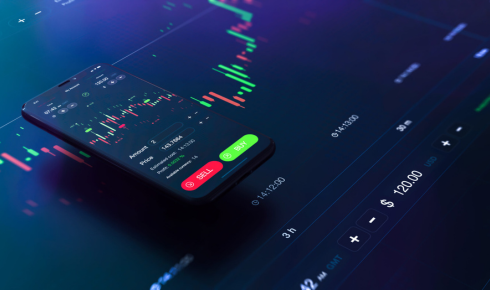An algo is a computer program that trades by using a set of rules or instructions that are called algorithms. These programs are also able to monitor changing conditions in the market, spot opportunities, and automatically place trades, or at least execute their strategies at a particular time. The idea is to gain from these opportunities as quickly as possible while also minimizing human error and, thereby, keeping one’s discipline in bringing trading strategies to fruition.
Application of Algo Trading in India
Algo trading in India is permitted via the sanctioned systems of exchanges and thus requires brokers duly constituted to access algorithmic trading. The steps involved are:
Strategizing – Traders will formulate a set of rules that are based on technical indicators or statistical models or any other market data.
Algorithm Coding – The strategy is coded, meaning expressed in the programming language that the trading system understands.
Backtests – The algorithm is then backtested against certain periods in history in order to judge its performance.
Paper Trading – Tests the strategy in live market conditions, without money being put at risk, to ensure that it works.
Live Execution – The algorithm now runs live with a real trading account, and trades are automatically executed.
Importance of a Trading Application in Algo Trading
A sound application for trading ensures success in algo trading, connecting the account of trader to market orders from the algorithm in real time. Some of the major features supporting algo trading are:
Speed Order Execution – Delays in signals taking place through the algorithm and placement of trade are minimized.
API Access – Many of the apps provide API access to allow for combination with individual algorithms.
Market Data Feeds – Algos make most of their decisions on the basis of real-time inputs from the market.
Portfolio Tracking – Investors can check on the currently open positions and the account performance anytime.
A functional and good trading app that integrates well with automated systems would make-well the running or excellent distractors between the strategy’s elegant execution and lively diversion.
Constituting the Equivalent Between Algo Trading and the Best Demat Account in India
A Demat account is the link between all the securities one trades with whether by hand or algorithm. The best Demat account in India, perfectly suited to your needs, that would best support algo trading must have these qualities:
Easy Integration with the broker’s trading platform.
Reliable Settlement Process ensuring correct trade settlements.
Lower Transaction Cost because the volumes will tend to be very high for high-frequency strategies and this cost will build up very rapidly.
Reporting Tools that support looking into performance and compliance.
When both your Demat account and trading application are credible, it lessens the operational risks so you can concentrate on improving the working strategy of the algorithm rather than fighting multiple technical problems.
The Common Algo Trading Strategies in India
Trend Following Strategies
Following the trend, different tools like moving average, breakout as well as channel pattern use the algorithms in following and executing trades with the direction of the trend.
Arbitrage Strategies
Algorithms take advantage of price differences between two related securities or markets. In India, this would involve equity and futures contracts of the same stock.
Mean Reversion Strategies
Prices will eventually return to average values. In that instance, the algorithm buys when prices are low concerning the average and sells when the price is on the higher side.
Scalping Strategies
Taking advantage of various very small trades for a day to gain from minor price changes is called scalping.
Trading based on news reports
Algorithms are reacting to the news events or economic announcements, and close positions within seconds to the corresponding data releases.
Advantages of Algo Trading
Discipline in Trading – The algorithms operate simply as per rules and have no interference from any emotional showcases.
Speed – As soon as the conditions that have been defined within the algorithm are satisfied, orders are filled.
Backtesting – There can be checks made on strategies through historical data without having lost any capital in reality.
Diversifying – Run concurrently in different markets and instruments under entirely different strategies.
Risks and Challenges
However, it has its share of risks. Some of the common challenges include:
Technical Failures – Among the most important categories is the network/software-related problems hindering execution.
Over-Optimization – Devise a strategy that works with past data and fails in live markets.
Market Changes – When drastic changes happen in the market, there may be a time when the strategy does not
Regulatory compliance – Algo trading should follow the rules established and will be enacted as per the definitions made by the Securities and Exchange Board of India (SEBI) in India.
Risk management involves setting stop-loss levels, constant monitoring of strategies, and changes in algorithms from time to time so that they adapt to current trends in the market.
How to Get Started with Algo Trading in India
Now open a Trading and Demat account
Choose any broker offering algo trading access as well as the best Demat account in India that meets your needs.
Learn the Basics
Understand those basics-the terminology used in the market-in addition to the rules for trading, and for developing the algorithm.
Choose a Trading App with API Access
Make sure your trading app of choice allows for the integration with your algorithm and provides real-time data feeds.
Develop and Test Your Strategy
Develop your algorithm, and test it in a live environment to practice.
Monitor and Improve
Automated systems need some degree of oversight to ascertain that they are producing out required results.
The Future of Algo Trading in India
Technology development and better internet access indicate that all forms of algo trading will gain even greater traction among the retail and institutional traders in India. While mobile-based trading apps are increasingly upgrading to more advanced features, such as API connectivity for enabling algorithm execution via cloud servers or integrated systems.

